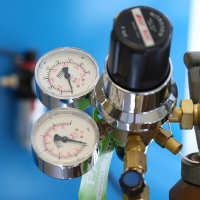Reaction & Catalysis Laboratory
 Our broad-ranging research, involving chemistry and materials science as well as chemical engineering, aims to conceive, design, model, characterise, control and optimise catalysts, reactors and processes for chemical and fuel synthesis, energy conversion and for treating effluents, wastes and spent catalysts.
Our broad-ranging research, involving chemistry and materials science as well as chemical engineering, aims to conceive, design, model, characterise, control and optimise catalysts, reactors and processes for chemical and fuel synthesis, energy conversion and for treating effluents, wastes and spent catalysts.
A core topic is catalyst technology, where computational methods and rapid prototyping techniques are being developed for rational design of porous catalyst supports, so the full potential of a catalyst can be realised. Other work in this area involves the treatment of industrial effluents, abatement of emissions from diesel and lead engines, for utilising carbon dioxide and for the synthesis of hydrocarbons.
Research revolving around reaction and reactor process design includes the design of structured catalytic reactors for liquid phase hydrogenation, selective oxidation, and for small scale hydrogen peroxide production. Membrane reactors are being developed especially for methane and natural gas conversion processes. Selective absorption, adsorption and permeation, with reaction are all being investigated, as are imposed thermal effects.
We also have a comprehensive programme in electrochemical engineering, where we study all aspects of electrochemical processes in order to convert electrical into chemical energy, and vice versa. Intermediate temperature solid oxide fuel cells are the subject of research projects and are being developed commercially by a College spin-out company.
The experimental programme is supported by targeted computational tools, integrating molecular aspects of catalyst surface chemistry, transport processes and reactor hydrodynamics with a view to understanding and simulating catalytic processes. The application of such tools has led to the design of new three-way automotive catalysts and selective hydrocarbon hydrogenation catalysts.